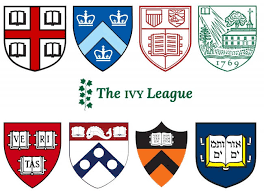College Advice: How to Ivy League?


You know how sometimes when you have a really pretty picture in your head, but when you try to draw it it turns out to be the worst creation in mankind’s history? That’s what applying to the Ivy Leagues is like. You see yourself, walking on the clippity-cloppity cobblestone paths, through the ancient buildings that once housed the most brilliant of minds and the greatest of talents, into the classrooms taught by world-class professors, and surrounded by the bests of the bests from all different areas of the world. The idea of attending the Ivy Leagues is like a sparkling gem enshrined upon a velvet cushion–it’s a glorious sight. But then POP! goes the dream bubble and all that remains is the sad realization that you have to be accepted first.
With an average of 40,000 applicants and a 6-7% acceptance rate per school, the unfortunate truth is that most hopeful applicants will see the dreaded phrase, “We regret to inform you…” when they check their emails on Ivy Day. So, how does one even win in this seemingly impossible competition between the bests of the bests?
Well, I did a little bit of digging around in the world wide web to find that magical formula that will equal an acceptance letter. There isn’t one. But I did learn a lot from my three-month mission. So, after the long introduction, here is what I’ve got:
Numbers don’t actually mean much when you look at it in context. Remember how I said “average” earlier? That means some people can have a 100% chance of acceptance while others have practically zero. Thinking about it in that sense makes the competition less daunting.
Every kid growing up was constantly reminded by teachers and parents to be well-rounded because that is what colleges look for. Play three sports, join two ensembles, participate in twenty clubs, be valedictorian; the more the better was what we were told. Well, scrap that idea. The admission officers practically evolved to detect application paddings–things that students do to please a college. These schools want authenticity over flattery, excellence over mediocrity, leaders over followers. The person who is a member of fifteen clubs is much less likely to be accepted than the one who is a leader in five. The bench-warmer for three sports is less likely to be accepted than the team captain of one. The last chair of two ensembles is less likely to be accepted than the concert master. You get what I mean?
But what if you are not a leader by nature? In that case, do what you love and just be yourself. That sounds cliche, and I agree it is, but it’s the truth. Be the best in the things you like to do and commit to it. You like to draw? Show that passion by taking art classes for all four years of high school and compete in competitions, whether you think you will win or not. Math? Join Mu Alpha Theta and Math Team. Writing? Join the newspaper or the Writing Center. By doing so, you are showing colleges what you are passionate about, and they love passion–it’s like handing candy to a toddler. Your passions don’t have to be academic, athletic, or artistic either. If you like helping people or animals, then volunteer! Start your own charity organisation if possible. Really, all you have to do is do what you love and love what you do.
Remember when I said don’t be well-rounded? Well, I lied (kind of). Here’s what I mean:
Say, for example, that you love music, and you focus solely on that while disregarding your academics, that’s a no no. Grades still matter. A lot. But if you are strong at academics and only focus on it while disregarding other activities, that’s also a no no. You need to have a good balance. Achieve high grades in your academics but also participate in other interesting activities, not because you have to but because you want to. You don’t have to be an academic, athlete, and artist at the same time to be well-rounded (though that’s not a bad thing to be at all); just be more than just one thing.

On top of being well-rounded, you also need to be pointy. Imagine a circle. That is your well-rounded base. Now imagine that the circle has a really pointy spike on it. That’s what you should be. A pointy circle. A spike can be literally anything, from playing some obscure musical instrument to being a world-class swimmer. The spike is your standing-out point. What makes you unique? What differentiates you from the other 39,999 applicants to the school? One of the most helpful pieces of advice I got was from a Georgia Tech representative during lunch. She said, “Be unique in a way that if you were to drop your application, without your name, in the hallways, someone who knows you can pick it up and return it to you without trouble. Be so unique that the admissions officer will assign an adjective to you.”
For example, a teacher of mine told me about two students, a girl and a guy, who both applied to Harvard. They both had the same grades and the same amount of activities and leadership. However, Harvard accepted the girl because of her passion for wind turbines. She volunteered and interned at a wind turbine site, did a senior research on wind turbines, and wrote her college essays about wind turbines; thus, she was known as the wind-turbine girl. That was her spike.
By now, I hope you get the idea of what I’m trying to say. Be well-rounded and have a spike (or more!), but don’t be too spiky that your circle starts to look deflated (unless you’re a world-class something, then you’re fine) or too rounded that your spike looks like a hump. Be authentic in your application–do what you love. Lastly, remember to show instead of tell.
Best of luck!




